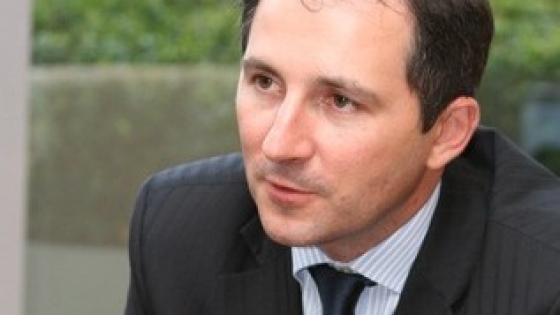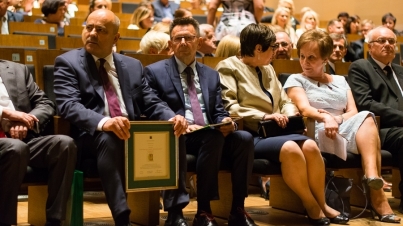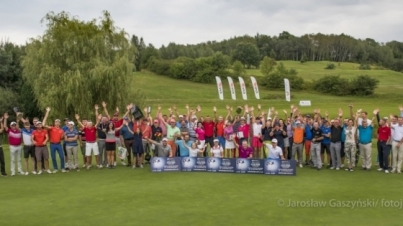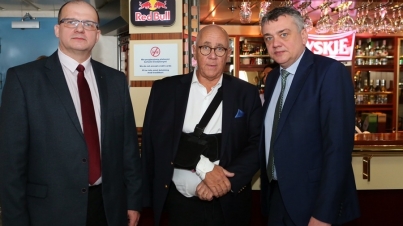News
News
People
Presentations
After Hours
Calendar
Currencies
Galleries
Advertising
About us
Contact
Adressess
Newsletter
In the Middle of the Crisis
An interview with Rafał Antczak, economist, Vice-President of Deloitte Poland.
 Rafał Antczak /SA/
Rafał Antczak /SA/
Szczecinbiznes.pl: There are entrepreneurs and politicians who claim that the crisis is real, whereas others persistently deny its existence. Which of these two views do you support?
Rafał Antczak: - Let’s not delude ourselves. There’s no denying that the crisis is real. The present situation meets the definition of a typical financial crisis, whose effects can be widely felt, for instance at the Warsaw Stock Exchange. Investors’ reactions are extremely emotional, changes swift, while the market out-of-balance. Globally, indices fell as much as several dozen percent YoY.
Fortunately, the effects of the downturn in the real sector, which is of key interest to all of us, are not so acute. Poland stands out among other countries. In Q1 our GDP growth dynamics were positive, which is exceptional. Apart from Poland, only the Chinese economy showed a considerably greater increase, while the GDP dynamics of the remaining countries were negative. In Poland, salary increase exceeds the inflation level. According to the data for May, remuneration increased by 3.8%, whereas inflation by 3.6%. Taxes in Poland were slightly reduced, which makes some of us believe, rightly, that our financial position even improved.
However, the actual scope of the problem is enormous and finding a solution to it will be time-consuming.
At what stage of the crisis are we now?
- It seems to me that we are right in the middle. We will be capable of providing more precise information in this respect in the third and fourth quarter, when data for the first half of the year is available and it is possible to determine, more or less, the condition of the Polish and other economies. Besides, the banking sector will provide up-to-date information on the situation - 90-day periods following which loans are reclassified will come to an end at that time. Banks will either look for capital or deposits to close the gap between loans and deposits, or undertake efforts to find new owners.
What is the impact of the crisis on the CEOs of large enterprises who participate in Deloitte conferences, including the one held in Szczecin?
- When you look at the enterprise sector as a whole, the head is in the fridge and the legs in the microwave. It is impossible draw any conclusions as the crisis regularity is that profitable companies are relatively in an even better position, while the situation of the worse ones is extremely bad.
In the Polish banking sector, deposits made by business entities constitute approximately PLN 130 billion, which accounts for about 11% of the GDP. Much as it is, these are deposits made by large enterprises. On the other hand, the position of small and medium enterprises is frequently alarming, as a lack of liquidity is becoming a serious problem. Bottlenecks are commonplace with no restructuring possibilities, which are greater in the case of large companies. Therefore, I would avoid generalizations.
Each company is different and so are individual sectors. For instance, the car industry in Western Europe and USA is going bankrupt, though at the same time it may be regarded as flourishing in Poland, as 95% of our production (or more) is for export.
EU funds are supposed to be an airbag on which the economy will stop. Will they really be?
- It’s about time the airbag inflated. Despite facilitated access to EU funds, we somehow fail to make the intended use of them. Indeed, the cheapest money is that on the table. We should take it as fast as we can, as first – the PLN exchange rate is advantageous and second – it’s time for large enterprises to take advantage of the current economic situation, increase their market share and finance their operations with cheap money. What is problematic, is the overall procedure itself and the fact that such investments must be reasonable from the economic perspective. And business entities must beware of “over-investing”. However, it seems that enterprises learned their lesson during the 2001-2002 economic slowdown.
Can Poland benefit from the crisis as a place for investing?
- Poland could benefit from the crisis, but we need to know how to do it. The image of Poland in international markets is far from favorable. The strong fluctuations we discussed are perceived by financial investors as a sign of considerable instability. The unfavorable opinions on the Polish economy are often meant to be a cover. That’s what we dealt with at the beginning of the year. The situation in individual European Union countries deteriorated, so the Western economic press reported on the situation of other countries, including Poland, which was supposed to get even worse. We were on the rising tide of negative opinions. When information to the contrary was published, commentators did not fully understand what was going on in the Polish economy. Investors are not fully aware that the macroeconomic data in Poland may provide misleading signals. A considerable part of the economy has not been restructured yet and operates based on slightly different mechanisms. It is an instance of backwardness in the crisis, which leads for example to situations where the effects of financial market events are not felt so quickly in the real sector. Approximately 30% of household income is the so called mixed income, which includes also revenues from the grey market. And this acts as another buffer.
What is more, the social and economic position of Poland differs from that of the majority of developed countries. We are a young society, in which a small demographic boom began (at present the 1980s baby boomers have babies) and the labor market is relatively flexible. Suddenly, in the crisis it turns out that trade unions agree to nominal pay cuts and in fact there are no serious demonstrations about it. So the myths according to which Poland is a country of trade unions with a rigid job market turned out to be false and were debunked, but foreign investors dislike such surprises. They would like to understand the environment where they operate. So we can be glad that our situation is so peculiar. In the fall it may turn out that a vast majority of developed economies are still facing problems which will not be resolved quickly, while the situation in Poland is fairly stable and some investors may regard our country as an alternative investment which may prove a good option when you don’t know where to invest. However, we will see how it works in the third quarter of this year.
As for investments, I would like to ask you about Euro 2012 – how much will cities such as Szczecin, which is not a host city, so it does not invest in roads, stadiums, hotels etc., lose?
- Such investments should always be subject to a life cycle cost analysis. We don’t know how successful Euro 2012 will be and how many visitors it will attract. At the beginning investments in infrastructure drive the economy but if subsequently the infrastructure is not used, it triggers fixed costs which have to be incurred. This denotes that cities investing in good stadiums and hotel facilities may not achieve the expected returns after the championships. And such infrastructure ought to function for some time following the end of the championships. And what if tourists do not flood those cities and sports and cultural events are not organized at a later time? I’m not saying that this is what we are in for, but it’s a tremendous challenge to ensure that investments do not turn into costs when the life cycle cost analysis is conducted.
What will the future of exporters be when we take into account that the crisis affecting our neighbors is even more serious than in Poland?
- One good news for exporters is that when the global economy gets over the crisis, exporters will be the first to notice that. The bad news is that the world has shrunk recently. In the majority of countries export dynamics decreased by 30-40%, which is an enormous problem all over the world. As a result, regionalization is replacing globalization. Investors’ perspective is limited and so is the scope of trade. And what it leads to is not as much backwardness as optimization. Such a situation turns out to be more favorable for Polish companies as they do not have to deal with foreign competitors that much. These processes are incredibly difficult to diagnose as they are fairly new and there is nothing to refer to. However, it appears to me that so far Polish enterprises have benefited from the crisis as they turned out to be more flexible and prepared for volatility, less bound by strict procedures or processes and less leveraged, that is not that much indebted.
And what can we expect as regards the Polish zloty exchange rate?
- The liquidity of the Polish zloty is not at risk until we enter the Euro zone. The future of our currency depends on the balance of payment. For some time now a thesis has been supported in particular by foreign investors that the deficit in the Polish current account will increase. Imbalance in foreign trade will be considerable, with no financing available on the capital inflow side. What happened? Well, as the major part of import is connected with export a decline in export one month leads to a similar downturn in import in the following month. The deficit simply started to decrease. Much less deficit had to be financed, which did not turn out to be a serious problem. Interestingly, it was generally assumed that Poland’s short-term debt exceeded our currency reserves, which was to trigger depreciation of the Polish zloty. Half of the above short-term debt was liabilities of subsidiaries to their parents. However, it’s difficult to argue that parent entities will lead to immediate bankruptcy of their subsidiaries. This is not the case and financing continues to be provided.
The volatility of our currency, like of the remaining financial markets, will be tremendous until we declare our accession to the Euro zone, when the process of finding a balance will commence. And what is the rate of balance? It is not altogether clear.
Haven’t you and your colleagues – analysts and economists – felt confused since the crisis struck? A little bit less sure of your arguments and decisions? Since the crisis hit, each analyst has been providing a different opinion. How do you feel now?
- I always recommend that information be verified on the Internet: forecasts, opinions and comments. It’s the easiest way to find a given person’s views expressed a year, two or three years ago.
Is it similar to TV weather forecasts then?
- Indeed. So is the case with economic analyses. I feel quite comfortable. In my previous job as a managing director and the chief economist of the PZU Group I focused on developing an investment strategy based on a significant stock market correction in 2008 and reduced GDP dynamics, which really worked out. I am satisfied that I was able to forecast that. I used to stress that Poland would have to deal with a stock market correction and the global crisis would be extremely serious and long-drawn-out as governments (including in particular in the USA) were incapable of dealing with its effects. I believe in one more wave of correction and reckon that we will still have to deal with volatility, both external and internal. This makes investors behave a bit unpredictably, like for instance yesterday (22 June – mab.), which translated into a fall in the WIG index by over 6%. It’s the most significant decrease among developed countries, which makes you think. The way you feel depends on the views you expressed two or three years ago. I feel quite comfortable with that.
Thank you for the interview.
Interview conducted in Szczecin on 23 June 2009.
Interviewer: Michał Abkowicz












































